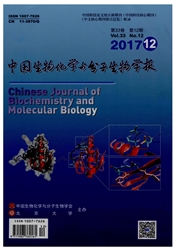

 中文摘要:
中文摘要:
β-抑制蛋白(β-arrestins)是一类在B肾上腺素受体激酶(pARK)提纯过程中发现的重要支架蛋白和信号调控因子;G蛋白偶联受体(GPCRs)为7次跨膜受体,在细胞信号转导中发挥关键作用,是很多临床药物的作用靶点.β-抑制蛋白作为衔接蛋白,调控GPCRs相关的信号通路,介导GPCRs的脱敏、内化、循环、复敏等生理过程,影响多种疾病的进程.本文总结了β-抑制蛋白参与GPCRs信号通路的研究进展,侧重阐明了其中的分子机制,以期为开发新一代调控GPCRs功能活性的相关药物提供理论基础.
 英文摘要:
英文摘要:
β-Arrestin is a scaffold protein that originally identified during the purification of β-adrenaline receptor kinase (βARK). Then, the β-arrestin proteins were recognized as important regulatory factors of seven-transmembrane G protein-coupled receptors (GPCRs) of common drug targets. β-Arrestins may act as adaptor proteins and play essential roles in signal transduction, desensitization, internalization, recycling and re-sensitization of GPCRs, thus to influence the occurrence, development, and accelaration and inhibition of the progression of diseases. In this review, we discuss the recent progress about the molecular mechanisms of β-arrestin-mediated GPCRs signals, which might provide useful foundation for developing a GPCR-targeting novel drugs.
 同期刊论文项目
同期刊论文项目
 同项目期刊论文
同项目期刊论文
 期刊信息
期刊信息
